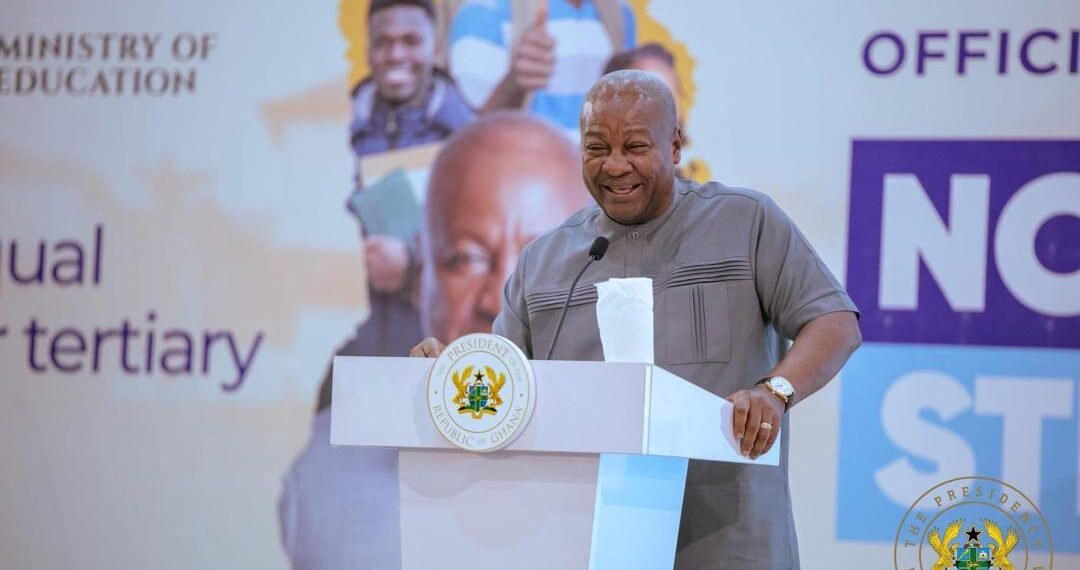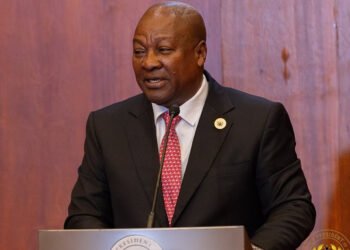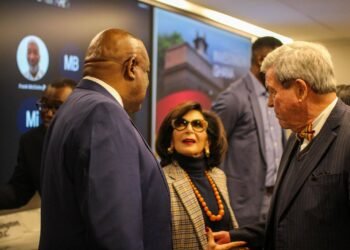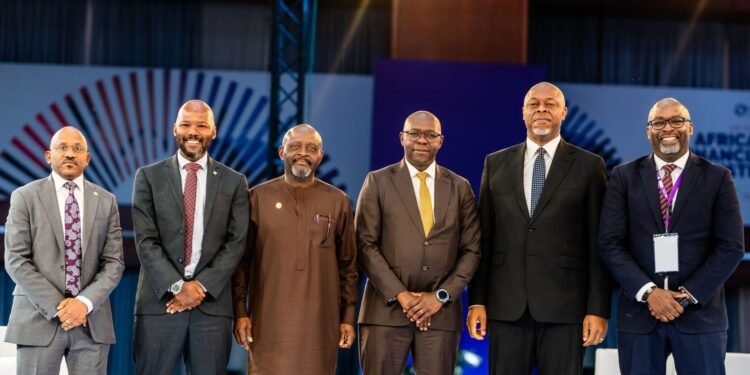President John Dramani Mahama has officially launched the highly anticipated “No Fee Stress” Policy—a transformative educational initiative aimed at removing financial barriers to tertiary education for Ghanaian students.
Speaking before a crowd of students, educators, and national stakeholders in the SDA College of Education – Asokore, Koforidua, President Mahama outlined a bold and compassionate vision for an inclusive tertiary education system.
This offers every qualified Ghanaian student the opportunity to learn, grow, and contribute to national development—regardless of their socio-economic background.
“This initiative was born out of real stories—true, painful, and inspirational stories,” President Mahama said, as he recalled the moment the policy was conceived.
One such story involved a young girl who had gained admission to study medicine at the University for Development Studies (UDS) but lacked the means to pay her academic fees.
“She was sitting beside her mother roasting plantain, hoping to raise enough money to go to school. We found her, paid her fees, and even secured funding for the entire duration of her studies.”
HE President John Dramani Mahama
That moment, he said, catalyzed a deeper reflection on the reality that far too many talented Ghanaian students are unable to continue their education simply because they cannot afford the cost of admission.
Another case that fueled the policy’s conception involved a brilliant young man who had qualified to study engineering at the Kwame Nkrumah University of Science and Technology (KNUST).

The President recounted how the student had not yet registered for school because his family was still waiting to harvest their crops to raise money.
“So again, we had to intervene and sort out the academic fees for the young man to go to school. So we realized that these are not isolated stories. These are real stories of people. We have free compulsory universal basic education in Ghana, and then we have introduced the free SHS program. So most parents do not pay anything for the education of their children until they finish senior high school.
“Then suddenly they are hit with the shock of having to cough up significant amounts of money to be able to put a student loan to register onto the student loan trust and apply for support to pay subsequent fees. So that was the thinking that went into the no-fee stress policy”.
HE President John Dramani Mahama
Ensuring Fairness
For him, the policy is more than a budgetary line item but a moral, constitutional, and developmental initiative aimed at ensuring fairness and restoring dignity to the Ghanaian student.
He assured that beginning with the 2024/25 academic year, the government will fully cover academic-related fees for all first-year students admitted to public universities, colleges of education, technical universities, and nursing training institutions.
President Mahama described the initiative as the most comprehensive and inclusive funding mechanism ever introduced for tertiary education in Ghana, explaining that it is designed not to replace existing allowances or loans, but rather to complement them by lifting the heavy burden of entry-level academic fees.
“In the 2022/23 academic year, over 150, 000 students were admitted to public tertiary institutions. Yet a significant number of thousands could not take up these admissions due to the inability to pay the academic related fees”.
HE President John Dramani Mahama
According to him, the Ghana Tertiary Education Commission has recorded increasing cases of students deferring or dropping out due to similar financial constraints.
Even students in colleges of education, who currently receive GHS 200 in monthly allowances, are required to pay up to GHS 1,362 in admission fees before they are even eligible to apply for loans.
“These are not just statistics. Behind each number is a face and a dream deferred,” President Mahama said poignantly. At the heart of the policy is the belief that tertiary education is the engine of modern development. “It creates our teachers, doctors, engineers, scientists, entrepreneurs, and public servants,” the President said.
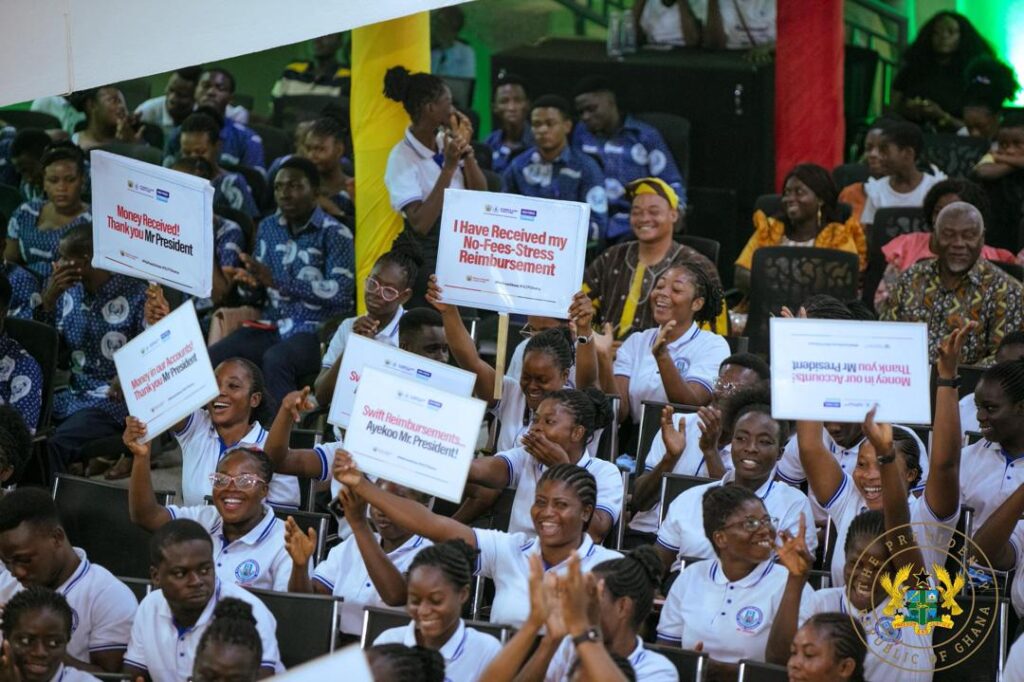
World Bank Data
Citing the World Bank, he noted that every additional year of tertiary education increases an individual’s earnings by up to 17% in developing countries.
Yet, according to the 2021 Population and Housing Census, only 18% of Ghanaians aged 18 and above have completed tertiary education. “In a nation striving to build a knowledge-driven economy, this gap is unacceptable,” he said.
In addition to waiving academic fees for first-year students, the “No Fee Stress” Policy includes several key components. Among them is the Student Loan Plus initiative—a revamped and structured financing model with enhanced support for continuing students.
This system will offer expanded eligibility criteria and simplified access procedures, aimed at removing bureaucratic bottlenecks that have traditionally discouraged applications.
Crucially, President Mahama announced that beginning next year, free tertiary education will be extended to all persons with disabilities from the first year until completion.
This, he said, is part of Ghana’s commitment to inclusion and compliance with the Disability Act. “No Ghanaian child—regardless of ability—should be denied the opportunity to pursue higher education,” he asserted.
To further bolster the initiative, the policy will also support students in fee-paying programs—those without regular track equivalents—by offering reinvestments of up to GHS 2,500 to offset academic fees.
Additionally, President Mahama noted that targeted scholarships will be made available to underrepresented communities critical to national development.
“This policy is not about welfare. It is about justice. It is about recognizing education as a right—not a privilege—for the wealthy few.”
HE President John Dramani Mahama
He referenced global examples, including Germany, Norway, Finland, and Scotland, where publicly supported tertiary education has not only reduced youth unemployment but also promoted civic engagement and national cohesion.

Student Urged to Embrace Opportunity
Ghana, he argued, must not be left behind but must prioritize its intellectual capital as the greatest national asset. Addressing students directly, he urged them to embrace the opportunity.
“This is your moment. Seize it, focus, and excel. And remember that your education is not only for your personal gain, but to serve the nation.”
HE President John Dramani Mahama
To institutional heads, President Mahama called for transparency and compassion in implementing the policy, asking them to be “models of effective public service delivery.”
He also invited private sector partners and development agencies to support the initiative through endowment funds, bursary schemes, and co-investment strategies that would sustain the policy’s longevity.
As of the launch date, President Mahama confirmed that over 150,000 students had accessed the online portal for the No Fee Stress application.
Out of these, he noted that 34,500 applications had been validated and were awaiting payment, and 15,000 students had already received payment alerts.
“This is just the beginning,” President Mahama assured, revealing that a new structure was being put in place to streamline student allowance payments through the Accountant General’s Department. “Now, just like your parents receive their salaries, you will receive your allowances monthly—loaded directly onto your phones.”

Fulfilment of Constitutional Mandate
In his concluding remarks, President Mahama framed the initiative as a fulfillment of Ghana’s constitutional mandate under Article 38(3), which guarantees equal educational opportunities for all citizens.
“This is how we build a Ghana where education is not rationed by class or cash, but granted by merit and upheld by our collective will,” he said. With a fervent prayer for Ghana’s youth, institutions, and nation, President Mahama declared the No Fee Stress Policy officially launched.
“Let it be known across this land: from today, no Ghanaian child will be denied entry into tertiary education because they cannot afford the academic fees. This is the path to a just society. This is how we secure a future where no dream is deferred and no potential wasted.”
HE President John Dramani Mahama
READ ALSO: GIIF, AfDB, and 24H+ Secretariat Sign Landmark Agreement to Develop Volta Economic Corridor

